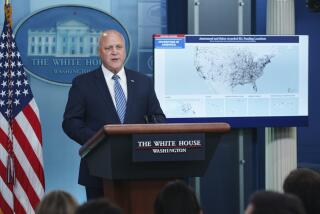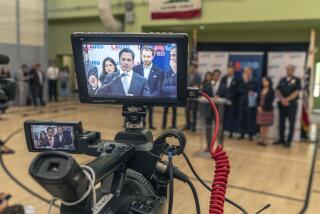Gore Calls for More Efforts to Link Schools to Internet
- Share via
WASHINGTON — Touting California’s high-profile “NetDay” last March, Vice President Al Gore and Education Secretary Richard W. Riley on Saturday urged parents, educators, community organizers and technology experts to launch similar volunteer efforts to bring schools onto the information superhighway.
Such access provides “a window that opens wide to a world of vast knowledge,” Gore told a conference convened here to help states plan grass-roots efforts to help connect schools to the Internet.
“But access is not enough,” Gore added. “We plan to use these new resources to revitalize classrooms--training teachers to use new technologies to stimulate their teaching and student learning.” He noted that jobs increasingly require computer skills and that workers who have such capabilities earn more money on average than those who do not.
Gore and Riley urged other states to follow California’s lead by sponsoring their own “NetDays” in October. Already, more than 30 states have scheduled such events.
In March, President Clinton joined 20,000 volunteers and 2,000 businesses in California to install about 6 million feet of wire linking classrooms in 2,600 schools to the Internet, an event that was described as a high-tech “barn-raising.”
Clinton has proposed a partnership between the federal government and the private and volunteer sectors to connect all of the nation’s schools with cyberspace. He has asked for $2 billion in federal funding over five years for the project.
The Clinton administration is pushing for free access to the information superhighway for schools. Current law gives schools and other education-related institutions the right to discounted rates, but Gore and others in the administration want a basic package of services to be provided at no cost.
Advocates say American children need exposure to cyberspace in school in order to compete effectively and to improve learning, productivity and performance.
Some critics have argued that computer access is worthless if a child cannot read, write or do math, and that education resources should not be diverted from the task of improving these basic skills.
Students across the nation currently make little use of new learning technologies, using them for only a few minutes every day, according to the Department of Education. Only 4% of schools have a computer for every five students, and only 9% of classrooms are connected to the Internet, the department said.
In schools with large numbers of low-income students, the statistics are even lower, the department said.
“Computers are the ‘new basic’ of American education, and the Internet is the blackboard of the future,” Riley said.
“I strongly believe that if we help all of our children learn the basics and become technologically literate, we will give a generation of young people the skills they need to enter this new knowledge- and information-driven economy,” he added.
Riley said the project would require a major commitment from sources beyond the federal government to meet the estimated $10 billion to $20 billion a year needed over five years for training and equipment.
“The challenge is a clarion call to local communities and states and to the private and nonprofit sectors from which leadership and initiative must come,” he said.
More to Read
Get the L.A. Times Politics newsletter
Deeply reported insights into legislation, politics and policy from Sacramento, Washington and beyond. In your inbox three times per week.
You may occasionally receive promotional content from the Los Angeles Times.










